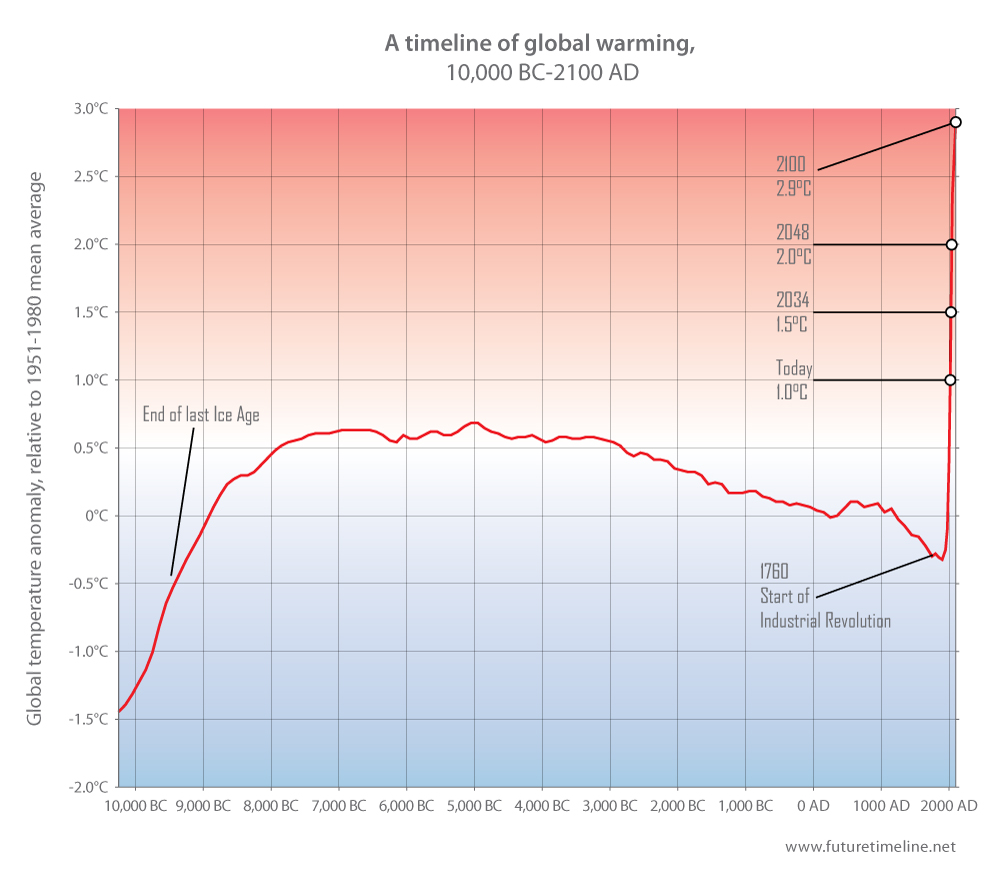
A timeline of global warming, 10,000 BC-2100 AD This graph shows how global average temperatures have changed over the millennia – from the end of the ice age, to the Industrial Revolution and through to the present day, with a future projection to 2100.
During the last ice age, global average temperatures plunged to as low as 4°C (7.2°F) below the mid-20th century average. Parts of the United States lay beneath almost a mile of ice, with glaciers reaching as far south as New York City. Mammoths and woolly rhinos roamed the land, while our ancient ancestors lived alongside Neanderthals, a now extinct subspecies of archaic humans. This period lasted for about 100,000 years and ended at the last stage of the Pleistocene epoch, known as the Younger Dryas. A gradual rise in temperatures and retreat of glaciers marked the beginning of the current geological epoch: the Holocene. Over the next several millennia, the global climate stabilised. Conditions became favourable for agriculture, enabling the human population to increase and the first civilisations to develop. Written history began around the 4th millennium BC and the passing down of knowledge from one generation to the next led to improvements in technology. A slight cooling trend emerged from about 3,000 BC onwards. This lasted until the second half of the first millennium – when the Medieval Warm Period affected the North Atlantic region – before continuing again through the Middle Ages, in what became known as the Little Ice Age. The year 1610, according to one definition, marked the beginning of the Anthropocene, or 'Age of Man', a fundamental change in the relationship between humans and the Earth system. A study published in 2015 noted two relevant trends: an irreversible linking of the New and Old Worlds, combined with a low point for carbon dioxide of 275 parts per million, after which levels in the atmosphere would inexorably increase for the next several centuries. Human emissions of carbon dioxide increased markedly from the late 18th century, as the Industrial Revolution transformed practically all aspects of society and led to the modern capitalist economy. By 1885, annual carbon dioxide (CO2) emissions from fossil fuels and industry exceeded 1 gigatonne. The 20th century and the post-war boom in particular saw vast improvements in technology and living standards. The soaring global population and explosion in demand for energy and other resources placed huge pressure on the natural world. By the 1970s, a critical threshold had been crossed: consumption by humans began outstripping what the planet could sustainably reproduce. In that same decade, the global average temperature reached an inflection point, as CO2 and other heat-trapping greenhouse gases began to overload the climate system. This has continued into the 21st century, driven by soaring emissions, which now stand at 35 gigatonnes annually for CO2 alone. That is between 80 and 270 times greater than the respective maximum and minimum natural CO2 output of volcanoes, according to the U.S. Geological Survey. A review of scientific papers last year concluded that 99.9% of peer-reviewed, published studies accept that climate change is mainly caused by human activity. As of today, global warming has reached 1°C – relative to 1951-1980 – and is rising at a rate that is unprecedented on geological timescales. The Earth is now the hottest it has been for over 120,000 years. If the current trend continues, we can expect 1.5°C by the mid-2030s and 2°C before 2050, with a possibility of nearly 3°C by century's end.
Sources: GISS Surface Temperature Analysis, NASA: Global Historical Temperature Record, 2° Institute: 2030 – Global warming continues to increase, Future Timeline: 2100 warming projections, Climate Action Tracker: Anthropocene: New dates proposed for the 'Age of Man', BBC News:
Posted: 9th October 2022. Last updated: 9th October 2022.
If you enjoy our content, please consider sharing it:
|







